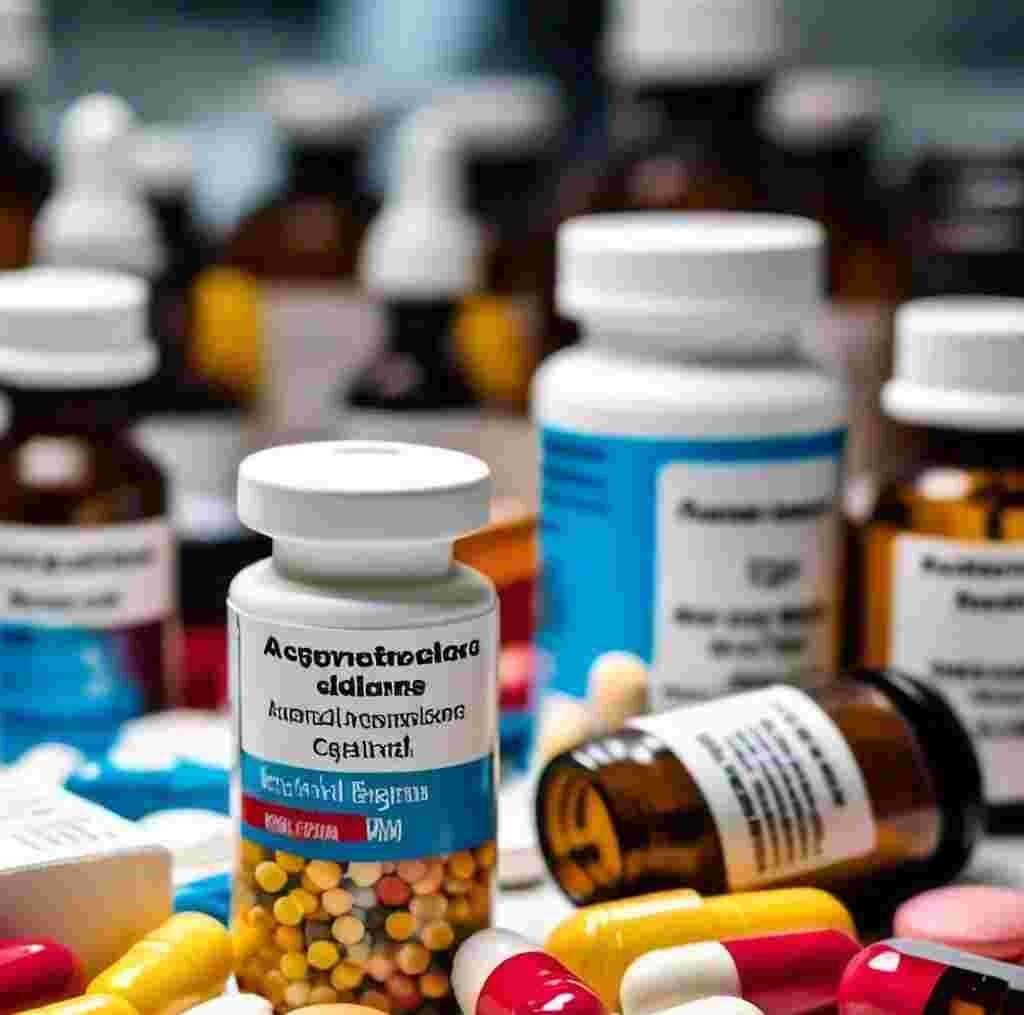Stomach infections, or gastrointestinal infections, occur when harmful bacteria, viruses, or parasites enter the digestive system, causing uncomfortable symptoms.
These infections can be caused by:
- Bacterial overgrowth: Harmful bacteria like E. coli, Salmonella, and Campylobacter
- Viral infections: Norovirus, Rotavirus, and Adenovirus
- Parasitic infestations: Giardiasis and Cryptosporidiosis
- Food poisoning: Consuming contaminated or spoiled food
- Poor hygiene: Inadequate handwashing or unsanitary conditions
If left untreated, stomach infections can lead to severe complications, such as dehydration, electrolyte imbalance, and even life-threatening conditions like sepsis.
The Role of Antibiotics
Antibiotics play a vital role in treating stomach infections caused by bacterial overgrowth. These medications help:
- Eliminate harmful bacteria: Targeting specific bacteria to reduce their numbers
- Relieve symptoms: Reducing severity and duration of symptoms like diarrhea, abdominal pain, and fever
- Prevent complications: Minimizing the risk of dehydration, electrolyte imbalance, and sepsis
Recommended Readings:
- Antibiotics For UTI | Antibiotics For UTI In Men+Women
- Best Antibiotics For Strep Throat | Strep Throat Antibiotics
- Over The Counter Antibiotics For Sinus Infection
- Best Antibiotic For Cough For Adults | Antibiotics For Cough And Cold
- List Of Strongest Antibiotics For Bacterial Infection | Antibiotics Tablets
Antibiotics For Gastroenteritis In Adults | Over The Counter Antibiotics For Stomach Infection

Table Of Contents
Understanding Stomach Infections
It’s essential to seek medical attention if symptoms persist, worsen, or are accompanied by bloody stools, severe abdominal pain, or signs of dehydration.

Types of Stomach Infections
| Type of Infection | Causes | Examples |
|---|---|---|
| Bacterial | Harmful bacteria enter the digestive system | Salmonella, E. coli, Helicobacter pylori (H. pylori) |
| Viral | Viruses attack the stomach and intestines | Norovirus, Rotavirus, Adenovirus |
| Parasitic | Parasites like protozoa or worms infect the stomach | Giardia, Cryptosporidium (Crypto) |
Common Symptoms of Stomach Infections
- Abdominal pain and cramps: Stomach tenderness, discomfort, or sharp pains
- Diarrhea: Frequent, loose, or watery stools
- Nausea and vomiting: Feeling queasy or forcing oneself to vomit
- Fever: Elevated body temperature (usually above 100.4°F)
- Dehydration signs: Excessive thirst, dark urine, decreased urine output, dizziness, or headaches
When Are Antibiotics Needed For Stomach Infections?
Remember, antibiotics should only be used under the guidance of a healthcare professional to ensure proper treatment and minimize risks.

Differentiating between Bacterial and Non-Bacterial Stomach Infections
Antibiotics are only effective against bacterial stomach infections. It’s crucial to differentiate between bacterial and non-bacterial infections to ensure proper treatment.
Bacterial Infections:
- Typically causes more severe symptoms
- May have blood in stool or vomit
- Can lead to life-threatening complications if left untreated
Non-Bacterial Infections (Viral or Parasitic):
- Usually cause milder symptoms
- Typically resolve on their own with supportive care
- Antibiotics are ineffective and may cause harm
Cases Where Antibiotics Are Prescribed
Antibiotics are prescribed for:
- Severe bacterial infections (e.g., Salmonella, E. coli)
- Infections that cause bloody stools or vomit
- Infections that lead to dehydration or electrolyte imbalance
- Infections in people with weakened immune systems (e.g., HIV/AIDS, cancer)
- Infections that don’t improve with supportive care
Importance of Proper Diagnosis
Accurate diagnosis is crucial to determine if antibiotics are necessary. This involves:
- Lab tests: Stool tests, blood tests, or endoscopy to identify the cause of infection
- Medical evaluation: Physical examination, medical history, and symptom assessment
Risks of Misusing Antibiotics
Misusing antibiotics can lead to:
- Antibiotic resistance: Bacteria become resistant to antibiotics, making infections harder to treat
- Side effects: Allergic reactions, diarrhea, yeast infections, or interactions with other medications
List Of 10 Best Antibiotics For Stomach Infection
| Rank | Antibiotic | Common Brand Names | Typical Adult Dose (for gastroenteritis) | Duration | Main Uses / Targeted Pathogens | Key Notes / Considerations |
|---|---|---|---|---|---|---|
| 1 | Azithromycin | Zithromax | 500 mg once daily or 1,000 mg single dose | 1–3 days | First-line for many cases (Campylobacter, Shigella, traveler’s diarrhea) | Preferred in areas with fluoroquinolone resistance; good for children too; fewer GI side effects |
| 2 | Ciprofloxacin | Cipro | 500 mg twice daily or 750 mg single dose | 1–3 days | Traveler’s diarrhea, E. coli, Salmonella (if sensitive) | Fluoroquinolone; resistance increasing globally (especially Campylobacter); avoid if possible in some regions |
| 3 | Levofloxacin | Levaquin | 500 mg once daily | 1–3 days | Similar to ciprofloxacin; traveler’s diarrhea | Fluoroquinolone alternative; resistance concerns similar to cipro |
| 4 | Rifaximin | Xifaxan | 200 mg three times daily | 3 days | Traveler’s diarrhea (non-invasive E. coli) | Non-absorbable; stays in gut; lower systemic side effects; not for invasive/bloody cases |
| 5 | Doxycycline | Vibramycin | 100 mg twice daily | 3 days | Cholera, some E. coli, traveler’s diarrhea | Tetracycline class; photosensitivity risk; not first-line for most |
| 6 | Trimethoprim-Sulfamethoxazole (TMP-SMX) | Bactrim, Septra | 160/800 mg twice daily | 3–5 days | Some Shigella, Salmonella, Yersinia | Resistance common in many areas; alternative when others unavailable |
| 7 | Metronidazole | Flagyl | 500–750 mg three times daily | 5–10 days | Clostridioides difficile, some parasites (not pure bacterial) | Anaerobic coverage; common for C. diff colitis; not for most enteric bacteria |
| 8 | Erythromycin | Ery-Tab | 500 mg four times daily | 3–5 days | Campylobacter (alternative) | Macrolide; older option; GI side effects common |
| 9 | Cefixime | Suprax | 400 mg once daily or divided | 3–5 days | Shigella (especially resistant strains), some others | Third-generation cephalosporin; useful in high-resistance areas |
| 10 | Amoxicillin | Amoxil | Varies (e.g., 500 mg three times daily) | 5–7 days | Sensitive Salmonella strains, some others | Limited use due to widespread resistance; not empiric |
Best Antibiotics For Stomach Infection
Note: Antibiotic dosages and durations may vary depending on individual cases and medical professionals’ recommendations. Always consult a healthcare professional for proper diagnosis and treatment.

Ciprofloxacin
- Effectiveness: Targets E. coli, Salmonella, Shigella, and Campylobacter
- Common dosages: 500mg every 12 hours for 5-7 days
- What is Ciprofloxacin used for?:
- Treats bacterial stomach infections
- Urinary tract infections
- Respiratory infections
Metronidazole (Flagyl)
- Usage: Effective against anaerobic bacteria and protozoa
- Dosage and duration: 500mg every 8 hours for 7-10 days (7 days may be enough for some cases)
- What is Flagyl used for?:
- Treats bacterial vaginosis
- Trichomoniasis
- Giardiasis
- Gastrointestinal infections
Azithromycin
- Broad-spectrum antibiotic: Treats gastrointestinal infections caused by various bacteria
- Usage: Effective in both adults and children
- Dosage: 500mg on day 1, followed by 250mg daily for 4-6 days
Cefixime
- Applications: Treats stomach infections caused by E. coli, Salmonella, and Shigella
- Comparison: More effective than amoxicillin against certain bacteria, but may have more side effects
Amoxicillin
- Effectiveness: Treats bacterial stomach infections, but may have limitations against certain bacteria
- Dosage: 500mg every 8 hours for 5-7 days
Combination Therapies
- When multiple antibiotics are prescribed: To target multiple bacteria or reduce resistance
- Example: Triple therapy for H. pylori infection:
- Clarithromycin (500mg twice daily)
- Amoxicillin (1000mg twice daily)
- Proton pump inhibitor (e.g., Omeprazole 20mg twice daily)
Levofloxacin
- Effectiveness: Targets E. coli, Salmonella, Shigella, and Campylobacter
- Dosage: 500mg once daily for 5-7 days
Moxifloxacin
- Broad-spectrum antibiotic: Treats gastrointestinal infections caused by various bacteria
- Dosage: 400mg once daily for 5-7 days
Tinidazole
- Usage: Effective against anaerobic bacteria and protozoa
- Dosage: 500mg every 12 hours for 3-5 days
Clarithromycin
- Effectiveness: Treats bacterial stomach infections, including H. pylori
- Dosage: 500mg twice daily for 7-14 days
Erythromycin
- Usage: Treats gastrointestinal infections caused by bacteria like Campylobacter
- Dosage: 250-500mg every 6 hours for 5-7 days
Doxycycline
- Broad-spectrum antibiotic: Treats gastrointestinal infections caused by various bacteria
- Dosage: 100mg twice daily for 5-7 days
Sulfamethoxazole-trimethoprim (Bactrim)
- Usage: Treats bacterial stomach infections, including E. coli and Salmonella
- Dosage: 800-160mg every 12 hours for 5-7 days
Natural Alternatives To Antibiotics
Important Note: Natural remedies should not replace severe or chronic stomach infection treatments. Consult a healthcare professional before using natural remedies, especially if you have underlying health conditions or take medications.

Strongest Natural Antibiotics for Stomach Infection
- Garlic:
- Benefits: Antimicrobial properties, reduces inflammation
- Limitations: May interact with blood thinners, can cause digestive issues
- Ginger:
- Benefits: Anti-inflammatory properties, soothes digestive system
- Limitations: May interact with blood thinners, can cause heartburn
- Oregano Oil:
- Benefits: Antimicrobial properties, reduces inflammation
- Limitations: May interact with blood thinners, can cause digestive issues
When to Consider Natural Remedies
- Mild Infections: Natural remedies can be effective for mild stomach infections, such as:
- Bacterial overgrowth
- Viral gastroenteritis
- Mild food poisoning
- Prevention Strategies: Natural remedies can also be used to prevent stomach infections, such as:
- Boosting immune system
- Maintaining gut health
- Practicing good hygiene
Additional Natural Remedies
- Probiotics: Maintains gut health, boosts immune system
- Slippery Elm: Soothes digestive system, reduces inflammation
- Peppermint Oil: Relieves digestive issues, reduces nausea
Antibiotics For Specific Stomach Infections
Note: Antibiotic regimens and dosages may vary depending on individual cases and medical professionals’ recommendations. Always consult a healthcare professional for proper diagnosis and treatment.

Antibiotics for Gastroenteritis
- Adults:
- Azithromycin (500mg daily for 3 days)
- Ciprofloxacin (500mg twice daily for 5-7 days)
- Pediatrics:
- Azithromycin (10mg/kg daily for 3 days)
- Cefixime (8mg/kg daily for 5-7 days)
Antibiotics for Intestinal Bacteria
- Bacterial Overgrowth:
- Rifaximin (550mg three times daily for 14 days)
- Metronidazole (250mg three times daily for 7-10 days)
- SIBO (Small Intestine Bacterial Overgrowth):
- Rifaximin (550mg three times daily for 14 days)
Antibiotics for H. pylori Infection
- Standard Regimens:
- Clarithromycin + Amoxicillin + PPI (Proton Pump Inhibitor)
- Metronidazole + Clarithromycin + PPI
- Success Rates:
- 70-90% eradication rate with standard regimens
Antibiotics for Abdominal Pain Related to Infections
- When Antibiotics are Necessary:
- Severe abdominal pain
- Fever above 101.5°F (38.6°C)
- Signs of peritonitis (inflammation of abdominal lining)
- Pain Management:
- Antibiotics should be used in conjunction with pain management strategies (e.g., analgesics, anti-inflammatory medications)
Region-Specific Recommendations
Note: Prices may vary depending on location, pharmacy, and availability. Consult a healthcare professional for proper diagnosis and treatment.

Best Antibiotics for Stomach Infection in Pakistan
- Availability:
- Ciprofloxacin
- Azithromycin
- Metronidazole
- Cefixime
- Commonly Prescribed Antibiotics:
- Ciprofloxacin (500mg twice daily for 5-7 days)
- Azithromycin (500mg daily for 3 days)
- Metronidazole (250mg three times daily for 7-10 days)
Accessibility and Cost Considerations
- Accessibility:
- Urban areas: Wide availability in pharmacies and hospitals
- Rural areas: Limited availability, may require travel to urban areas
- Cost Considerations:
- Ciprofloxacin: ₨500-₨1,000 (approximately $3-6 USD) for a 5-day course
- Azithromycin: ₨1,000-₨2,000 (approximately $6-12 USD) for a 3-day course
- Metronidazole: ₨300-₨600 (approximately $2-4 USD) for a 7-day course
Prevention And Management Of Stomach Infections
Note: Consult a healthcare professional for personalized advice on preventing and managing stomach infections.

Hygiene and Sanitation
- Handwashing:
- Frequent handwashing with soap and water
- Especially after using the bathroom and before handling food
- Food Safety Practices:
- Properly store and refrigerate food
- Cook food thoroughly
- Avoid cross-contamination
Probiotics and Gut Health
- Role of Probiotics:
- Maintain gut health
- Boost immune system
- Prevent infections
- Probiotic-Rich Foods:
- Yogurt
- Kefir
- Sauerkraut
- Kimchi
Vaccinations
- Available Vaccines:
- Rotavirus vaccine (for children)
- Typhoid vaccine (for travelers and high-risk individuals)
- Hepatitis A vaccine (for travelers and high-risk individuals)
- Benefits of Vaccination:
- Prevents stomach infections
- Reduces the severity of symptoms
- Protects vulnerable populations (e.g., children, elderly)
Additional Prevention Strategies
- Stay Hydrated: Drink plenty of clean water
- Avoid Close Contact: With individuals who have stomach infections
- Practice Good Hygiene: During menstruation, urination, and bowel movements
Frequently Asked Questions (FAQs) – Antibiotics For Stomach Infection
What kills stomach infections?
Antibiotics, such as ciprofloxacin, amoxicillin, and cefixime, can effectively kill stomach infections caused by bacteria. Natural remedies like garlic, ginger, and oregano oil also have antimicrobial properties that can help combat stomach infections.
Is ciprofloxacin good for stomach infections?
Yes, ciprofloxacin is commonly prescribed to treat stomach infections caused by bacteria like E. coli, Salmonella, and Shigella. However, it’s essential to consult a doctor for proper diagnosis and treatment.
Can amoxicillin treat stomach infections?
Yes, amoxicillin can treat stomach infections caused by bacteria like H. pylori, E. coli, and Salmonella. However, it’s crucial to follow the doctor’s prescription and complete the full treatment course.
Which is better, cefixime or amoxicillin?
Both cefixime and amoxicillin are effective antibiotics, but the choice between them depends on the specific infection, severity, and individual patient factors. Cefixime is often prescribed for more severe infections, while amoxicillin is commonly used for milder cases.
What is the best natural antibiotic for stomach infections?
Garlic is considered one of the best natural antibiotics for stomach infections due to its potent antimicrobial properties. Other natural remedies like ginger, oregano oil, and probiotics can also help combat stomach infections.
What are the symptoms of a stomach infection?
Common symptoms of stomach infections include:
1. Abdominal pain and cramping
2. Diarrhea or constipation
3. Vomiting
4. Fever
5. Bloating and gas
6. Loss of appetite
7. Nausea
Can stomach infections be prevented?
Yes, stomach infections can be prevented by:
1. Practicing good hygiene and sanitation
2. Washing hands frequently
3. Avoiding close contact with infected individuals
4. Avoiding contaminated food and water
5. Getting vaccinated against certain infections
How long does it take to recover from a stomach infection?
Recovery time varies depending on the severity of the infection, treatment, and individual factors. Mild cases may resolve within 3-5 days, while more severe cases may take 7-10 days or longer to recover.
Can stomach infections lead to complications?
Yes, if left untreated or poorly managed, stomach infections can lead to complications like:
1. Dehydration
2. Electrolyte imbalance
3. Septicemia (blood infection)
4. Perforation of the stomach or intestine
5. Chronic conditions like IBS or gastritis
When should I seek medical attention for a stomach infection?
Seek medical attention if you experience:
1. Severe abdominal pain
2. Vomiting blood or black tarry stools
3. Fever above 101.5°F (38.6°C)
4. Signs of dehydration
5. Persistent symptoms or worsening condition
Can stomach infections be treated at home?
Yes, mild stomach infections can be treated at home with rest, hydration, and over-the-counter medications. However, severe cases require medical attention.
Can stomach infections affect children?
Yes, children are more susceptible to stomach infection due to their developing immune system. Rotavirus and norovirus are common causes of stomach infections in children.
Can stomach infections occur during pregnancy?
Yes, stomach infections can occur during pregnancy, which may increase the risk of complications. Pregnant women should seek medical attention if symptoms persist or worsen.
Can stomach infections cause long-term damage?
Yes, if left untreated or poorly managed, stomach infection can lead to long-term damage, such as:
1. Chronic gastritis
2. Ulcers
3. IBS (irritable bowel syndrome)
4. Malabsorption
Can stomach infections be a sign of an underlying condition?
Yes, stomach infection can be a symptom of underlying conditions like:
1. Celiac disease
2. Crohn’s disease
3. Ulcerative colitis
4. Gastroesophageal reflux disease (GERD)
………………………….
Disclaimer:
Commissions we earn from partner links on this page do not influence our content. Our editorial content is based on thorough research and insights from qualified medical professionals to ensure the highest standards of accuracy and reliability.
Information provided on Doseway is for educational purposes only. Your health and wellness are unique to you, and the products and services we review may not be suitable for your circumstances. We do not offer personal medical advice, diagnosis, or treatment plans. For specific advice, please consult with a healthcare professional. Doseway adheres to strict editorial integrity standards. To the best of our knowledge, all content is accurate as of the date posted, though offers and information may change. The opinions expressed are the author’s own and have not been influenced, approved, or endorsed by our partners.
……………………………..

 Cart is empty
Cart is empty
Add a Comment